Assessment of Student Attitudes towards Mathematics
VerifiedAdded on 2019/09/23
|15
|3600
|185
Report
AI Summary
Here is a summary of the assignment content: The study aims to examine the relationship between students' attitudes towards mathematics and their academic performance. The Attitudes Towards Mathematics Inventory (ATMI) was used to assess students' attitudes towards mathematics, while teachers completed an interview questionnaire to provide insights into students' behavior and attitude towards mathematics in class. The study's findings will be used to develop strategies for improving students' attitudes and ultimately, their academic performance in mathematics.
Contribute Materials
Your contribution can guide someone’s learning journey. Share your
documents today.
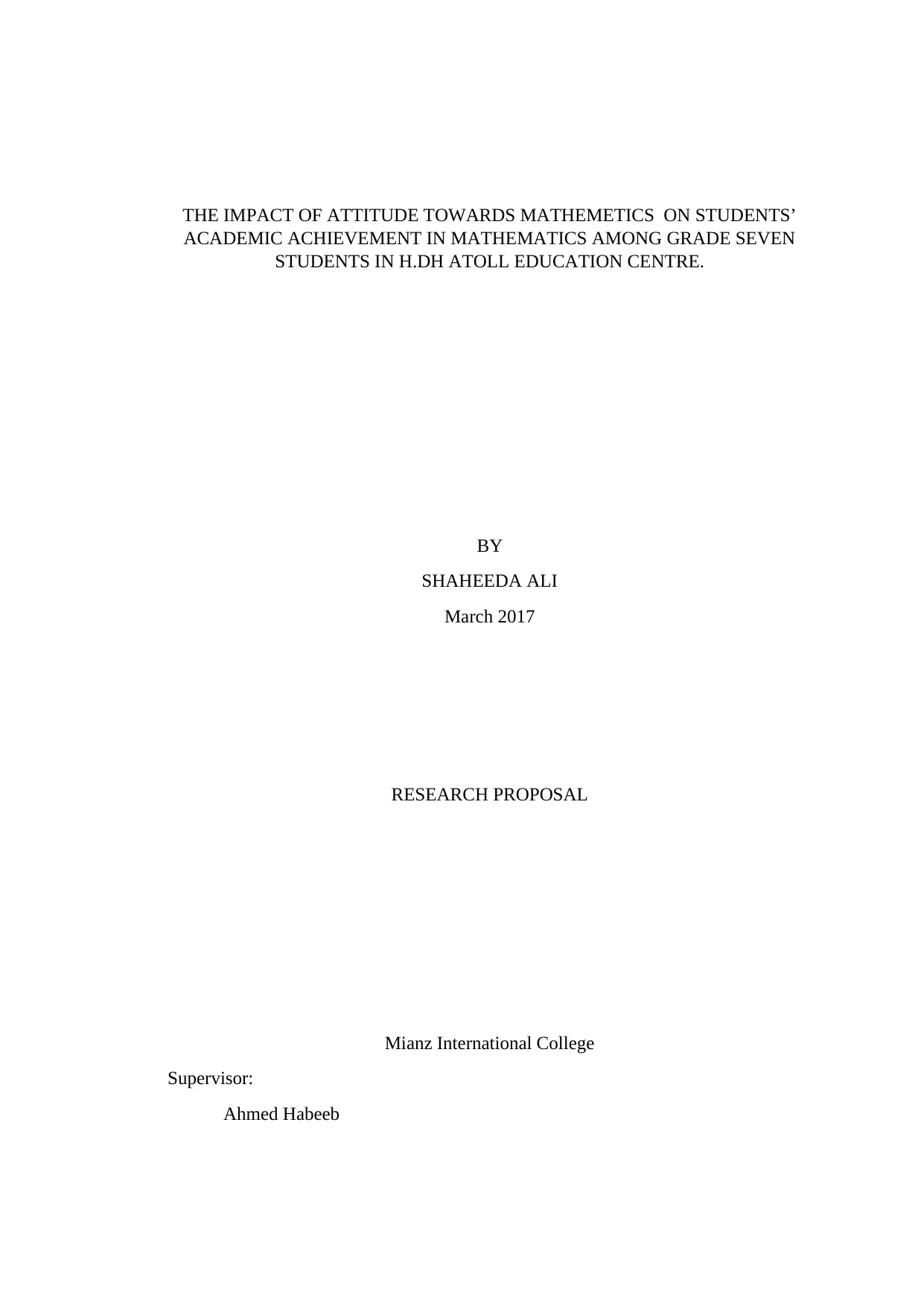
THE IMPACT OF ATTITUDE TOWARDS MATHEMETICS ON STUDENTS’
ACADEMIC ACHIEVEMENT IN MATHEMATICS AMONG GRADE SEVEN
STUDENTS IN H.DH ATOLL EDUCATION CENTRE.
BY
SHAHEEDA ALI
March 2017
RESEARCH PROPOSAL
Mianz International College
Supervisor:
Ahmed Habeeb
ACADEMIC ACHIEVEMENT IN MATHEMATICS AMONG GRADE SEVEN
STUDENTS IN H.DH ATOLL EDUCATION CENTRE.
BY
SHAHEEDA ALI
March 2017
RESEARCH PROPOSAL
Mianz International College
Supervisor:
Ahmed Habeeb
Secure Best Marks with AI Grader
Need help grading? Try our AI Grader for instant feedback on your assignments.
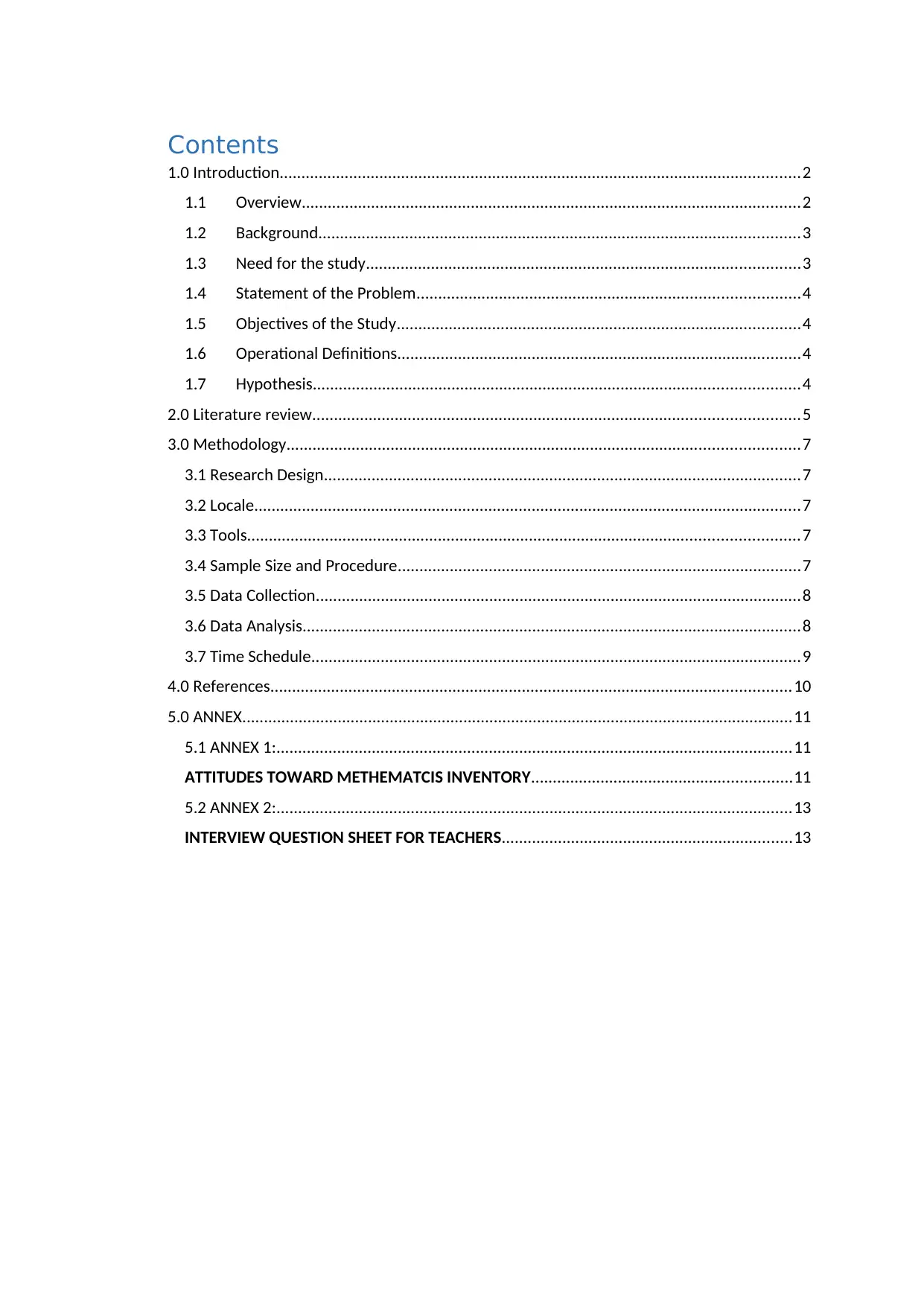
Contents
1.0 Introduction........................................................................................................................2
1.1 Overview...................................................................................................................2
1.2 Background...............................................................................................................3
1.3 Need for the study....................................................................................................3
1.4 Statement of the Problem........................................................................................4
1.5 Objectives of the Study.............................................................................................4
1.6 Operational Definitions.............................................................................................4
1.7 Hypothesis................................................................................................................4
2.0 Literature review................................................................................................................5
3.0 Methodology......................................................................................................................7
3.1 Research Design..............................................................................................................7
3.2 Locale..............................................................................................................................7
3.3 Tools...............................................................................................................................7
3.4 Sample Size and Procedure.............................................................................................7
3.5 Data Collection................................................................................................................8
3.6 Data Analysis...................................................................................................................8
3.7 Time Schedule.................................................................................................................9
4.0 References........................................................................................................................10
5.0 ANNEX...............................................................................................................................11
5.1 ANNEX 1:.......................................................................................................................11
ATTITUDES TOWARD METHEMATCIS INVENTORY............................................................11
5.2 ANNEX 2:.......................................................................................................................13
INTERVIEW QUESTION SHEET FOR TEACHERS...................................................................13
1.0 Introduction........................................................................................................................2
1.1 Overview...................................................................................................................2
1.2 Background...............................................................................................................3
1.3 Need for the study....................................................................................................3
1.4 Statement of the Problem........................................................................................4
1.5 Objectives of the Study.............................................................................................4
1.6 Operational Definitions.............................................................................................4
1.7 Hypothesis................................................................................................................4
2.0 Literature review................................................................................................................5
3.0 Methodology......................................................................................................................7
3.1 Research Design..............................................................................................................7
3.2 Locale..............................................................................................................................7
3.3 Tools...............................................................................................................................7
3.4 Sample Size and Procedure.............................................................................................7
3.5 Data Collection................................................................................................................8
3.6 Data Analysis...................................................................................................................8
3.7 Time Schedule.................................................................................................................9
4.0 References........................................................................................................................10
5.0 ANNEX...............................................................................................................................11
5.1 ANNEX 1:.......................................................................................................................11
ATTITUDES TOWARD METHEMATCIS INVENTORY............................................................11
5.2 ANNEX 2:.......................................................................................................................13
INTERVIEW QUESTION SHEET FOR TEACHERS...................................................................13
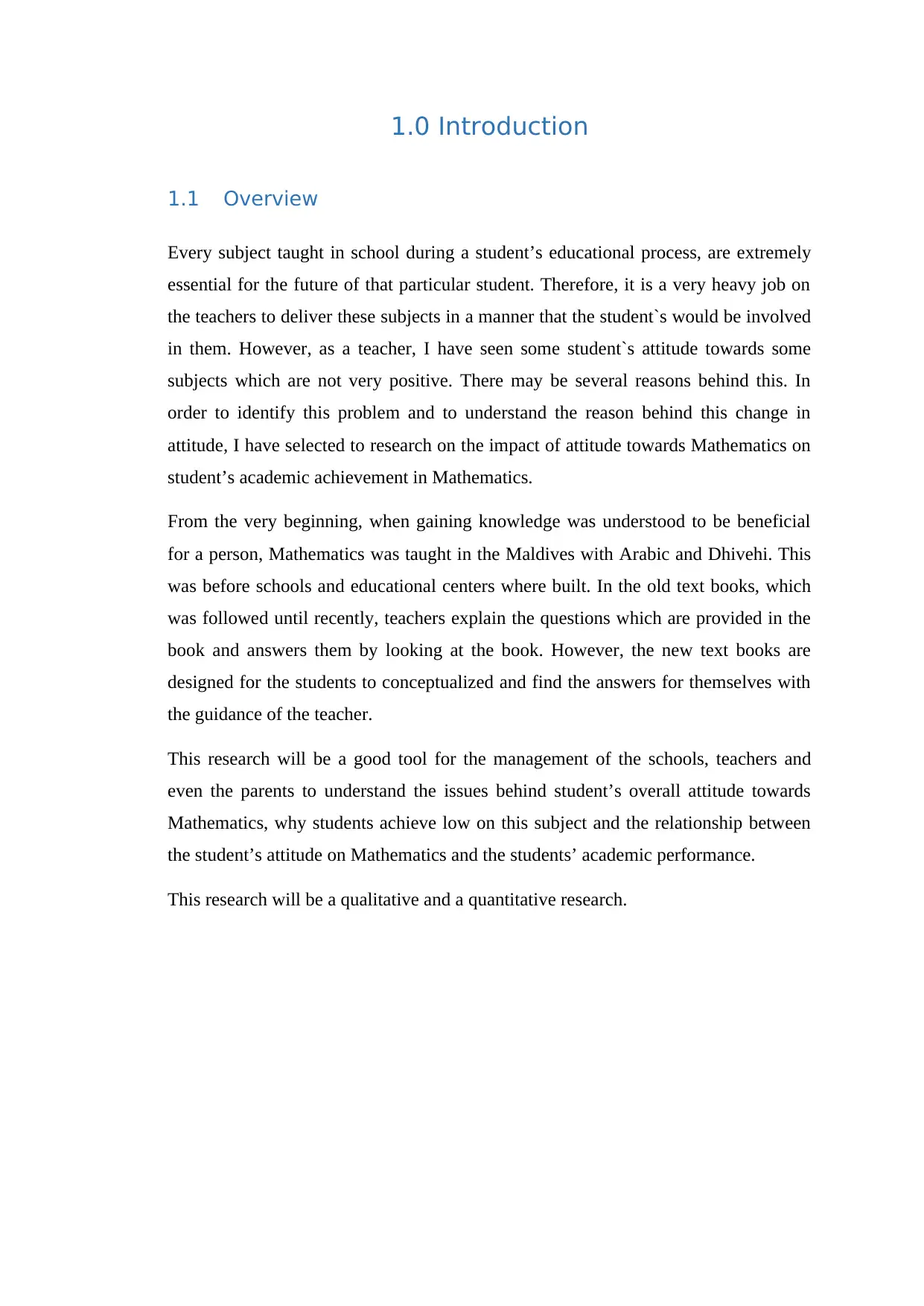
1.0 Introduction
1.1 Overview
Every subject taught in school during a student’s educational process, are extremely
essential for the future of that particular student. Therefore, it is a very heavy job on
the teachers to deliver these subjects in a manner that the student`s would be involved
in them. However, as a teacher, I have seen some student`s attitude towards some
subjects which are not very positive. There may be several reasons behind this. In
order to identify this problem and to understand the reason behind this change in
attitude, I have selected to research on the impact of attitude towards Mathematics on
student’s academic achievement in Mathematics.
From the very beginning, when gaining knowledge was understood to be beneficial
for a person, Mathematics was taught in the Maldives with Arabic and Dhivehi. This
was before schools and educational centers where built. In the old text books, which
was followed until recently, teachers explain the questions which are provided in the
book and answers them by looking at the book. However, the new text books are
designed for the students to conceptualized and find the answers for themselves with
the guidance of the teacher.
This research will be a good tool for the management of the schools, teachers and
even the parents to understand the issues behind student’s overall attitude towards
Mathematics, why students achieve low on this subject and the relationship between
the student’s attitude on Mathematics and the students’ academic performance.
This research will be a qualitative and a quantitative research.
1.1 Overview
Every subject taught in school during a student’s educational process, are extremely
essential for the future of that particular student. Therefore, it is a very heavy job on
the teachers to deliver these subjects in a manner that the student`s would be involved
in them. However, as a teacher, I have seen some student`s attitude towards some
subjects which are not very positive. There may be several reasons behind this. In
order to identify this problem and to understand the reason behind this change in
attitude, I have selected to research on the impact of attitude towards Mathematics on
student’s academic achievement in Mathematics.
From the very beginning, when gaining knowledge was understood to be beneficial
for a person, Mathematics was taught in the Maldives with Arabic and Dhivehi. This
was before schools and educational centers where built. In the old text books, which
was followed until recently, teachers explain the questions which are provided in the
book and answers them by looking at the book. However, the new text books are
designed for the students to conceptualized and find the answers for themselves with
the guidance of the teacher.
This research will be a good tool for the management of the schools, teachers and
even the parents to understand the issues behind student’s overall attitude towards
Mathematics, why students achieve low on this subject and the relationship between
the student’s attitude on Mathematics and the students’ academic performance.
This research will be a qualitative and a quantitative research.
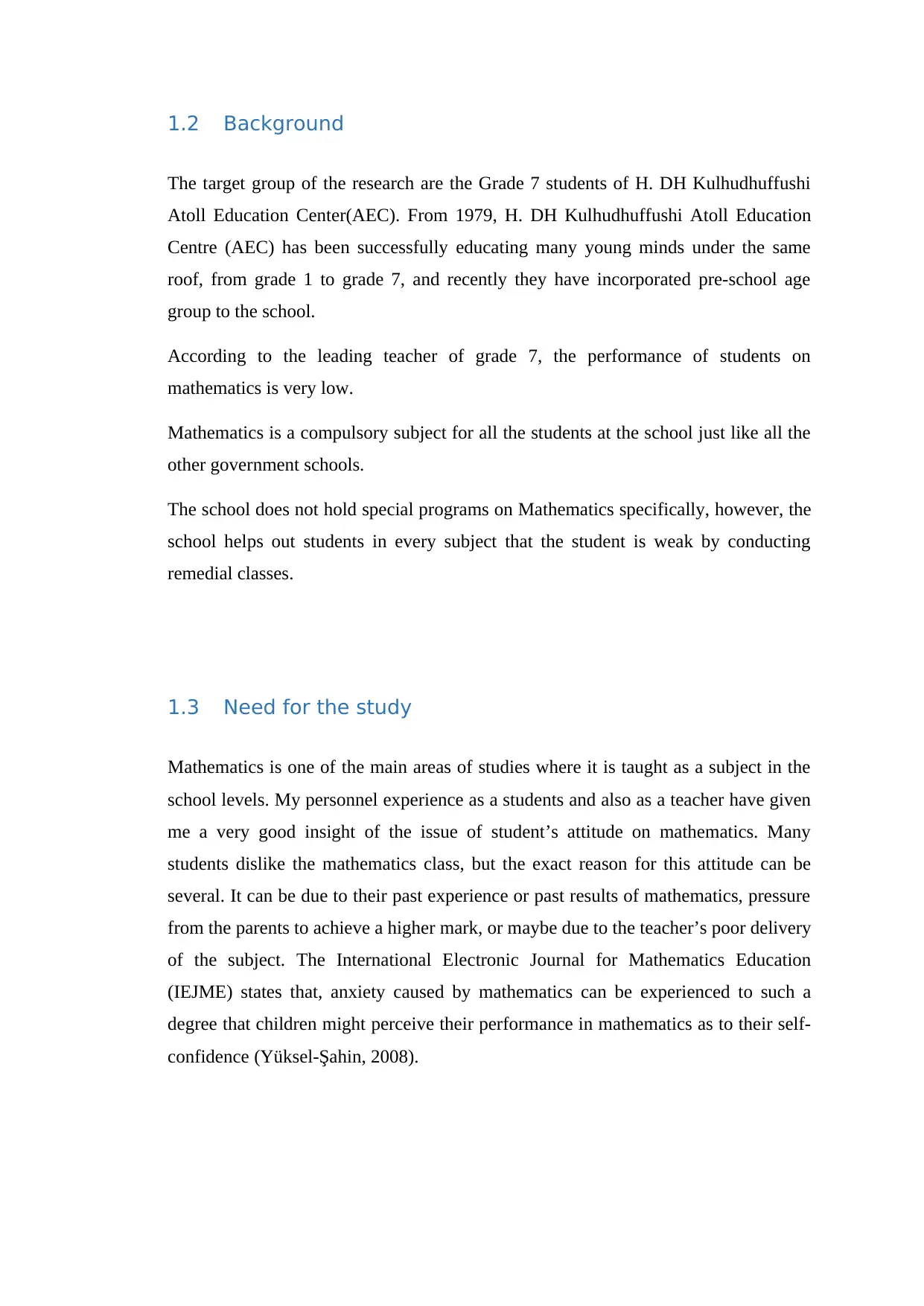
1.2 Background
The target group of the research are the Grade 7 students of H. DH Kulhudhuffushi
Atoll Education Center(AEC). From 1979, H. DH Kulhudhuffushi Atoll Education
Centre (AEC) has been successfully educating many young minds under the same
roof, from grade 1 to grade 7, and recently they have incorporated pre-school age
group to the school.
According to the leading teacher of grade 7, the performance of students on
mathematics is very low.
Mathematics is a compulsory subject for all the students at the school just like all the
other government schools.
The school does not hold special programs on Mathematics specifically, however, the
school helps out students in every subject that the student is weak by conducting
remedial classes.
1.3 Need for the study
Mathematics is one of the main areas of studies where it is taught as a subject in the
school levels. My personnel experience as a students and also as a teacher have given
me a very good insight of the issue of student’s attitude on mathematics. Many
students dislike the mathematics class, but the exact reason for this attitude can be
several. It can be due to their past experience or past results of mathematics, pressure
from the parents to achieve a higher mark, or maybe due to the teacher’s poor delivery
of the subject. The International Electronic Journal for Mathematics Education
(IEJME) states that, anxiety caused by mathematics can be experienced to such a
degree that children might perceive their performance in mathematics as to their self-
confidence (Yüksel-Şahin, 2008).
The target group of the research are the Grade 7 students of H. DH Kulhudhuffushi
Atoll Education Center(AEC). From 1979, H. DH Kulhudhuffushi Atoll Education
Centre (AEC) has been successfully educating many young minds under the same
roof, from grade 1 to grade 7, and recently they have incorporated pre-school age
group to the school.
According to the leading teacher of grade 7, the performance of students on
mathematics is very low.
Mathematics is a compulsory subject for all the students at the school just like all the
other government schools.
The school does not hold special programs on Mathematics specifically, however, the
school helps out students in every subject that the student is weak by conducting
remedial classes.
1.3 Need for the study
Mathematics is one of the main areas of studies where it is taught as a subject in the
school levels. My personnel experience as a students and also as a teacher have given
me a very good insight of the issue of student’s attitude on mathematics. Many
students dislike the mathematics class, but the exact reason for this attitude can be
several. It can be due to their past experience or past results of mathematics, pressure
from the parents to achieve a higher mark, or maybe due to the teacher’s poor delivery
of the subject. The International Electronic Journal for Mathematics Education
(IEJME) states that, anxiety caused by mathematics can be experienced to such a
degree that children might perceive their performance in mathematics as to their self-
confidence (Yüksel-Şahin, 2008).
Secure Best Marks with AI Grader
Need help grading? Try our AI Grader for instant feedback on your assignments.
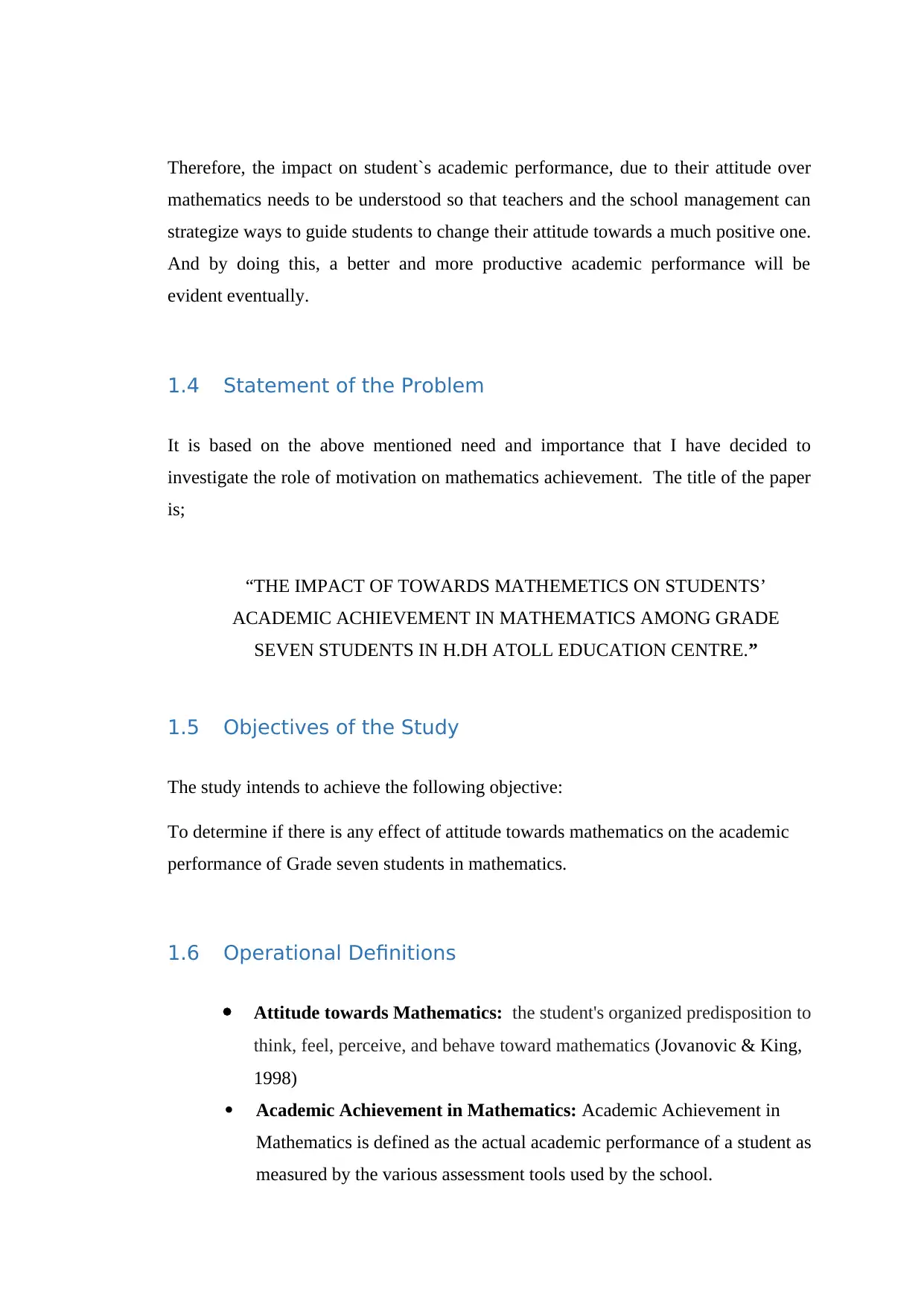
Therefore, the impact on student`s academic performance, due to their attitude over
mathematics needs to be understood so that teachers and the school management can
strategize ways to guide students to change their attitude towards a much positive one.
And by doing this, a better and more productive academic performance will be
evident eventually.
1.4 Statement of the Problem
It is based on the above mentioned need and importance that I have decided to
investigate the role of motivation on mathematics achievement. The title of the paper
is;
“THE IMPACT OF TOWARDS MATHEMETICS ON STUDENTS’
ACADEMIC ACHIEVEMENT IN MATHEMATICS AMONG GRADE
SEVEN STUDENTS IN H.DH ATOLL EDUCATION CENTRE.”
1.5 Objectives of the Study
The study intends to achieve the following objective:
To determine if there is any effect of attitude towards mathematics on the academic
performance of Grade seven students in mathematics.
1.6 Operational Definitions
Attitude towards Mathematics: the student's organized predisposition to
think, feel, perceive, and behave toward mathematics (Jovanovic & King,
1998)
Academic Achievement in Mathematics: Academic Achievement in
Mathematics is defined as the actual academic performance of a student as
measured by the various assessment tools used by the school.
mathematics needs to be understood so that teachers and the school management can
strategize ways to guide students to change their attitude towards a much positive one.
And by doing this, a better and more productive academic performance will be
evident eventually.
1.4 Statement of the Problem
It is based on the above mentioned need and importance that I have decided to
investigate the role of motivation on mathematics achievement. The title of the paper
is;
“THE IMPACT OF TOWARDS MATHEMETICS ON STUDENTS’
ACADEMIC ACHIEVEMENT IN MATHEMATICS AMONG GRADE
SEVEN STUDENTS IN H.DH ATOLL EDUCATION CENTRE.”
1.5 Objectives of the Study
The study intends to achieve the following objective:
To determine if there is any effect of attitude towards mathematics on the academic
performance of Grade seven students in mathematics.
1.6 Operational Definitions
Attitude towards Mathematics: the student's organized predisposition to
think, feel, perceive, and behave toward mathematics (Jovanovic & King,
1998)
Academic Achievement in Mathematics: Academic Achievement in
Mathematics is defined as the actual academic performance of a student as
measured by the various assessment tools used by the school.
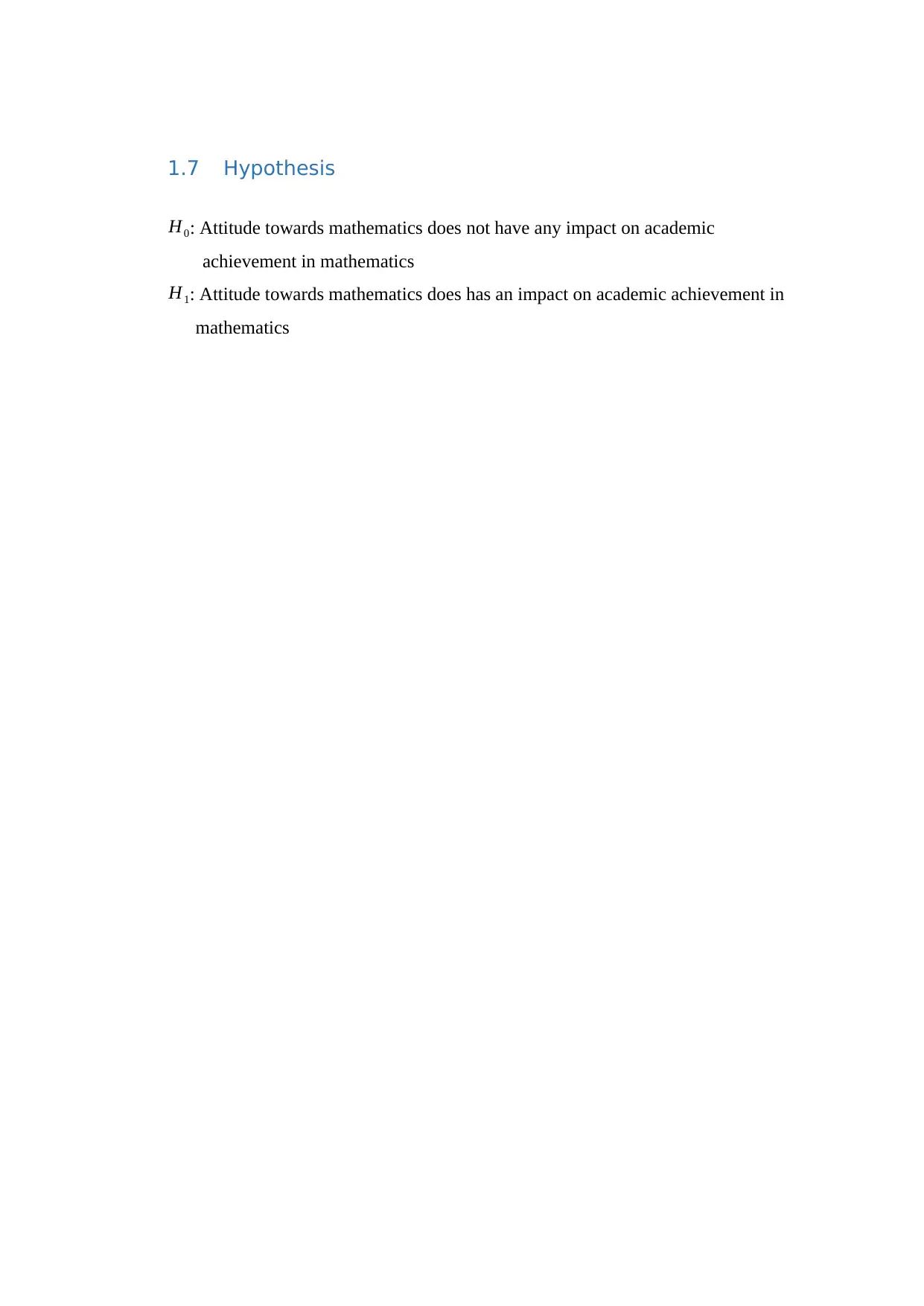
1.7 Hypothesis
H0: Attitude towards mathematics does not have any impact on academic
achievement in mathematics
H1: Attitude towards mathematics does has an impact on academic achievement in
mathematics
H0: Attitude towards mathematics does not have any impact on academic
achievement in mathematics
H1: Attitude towards mathematics does has an impact on academic achievement in
mathematics
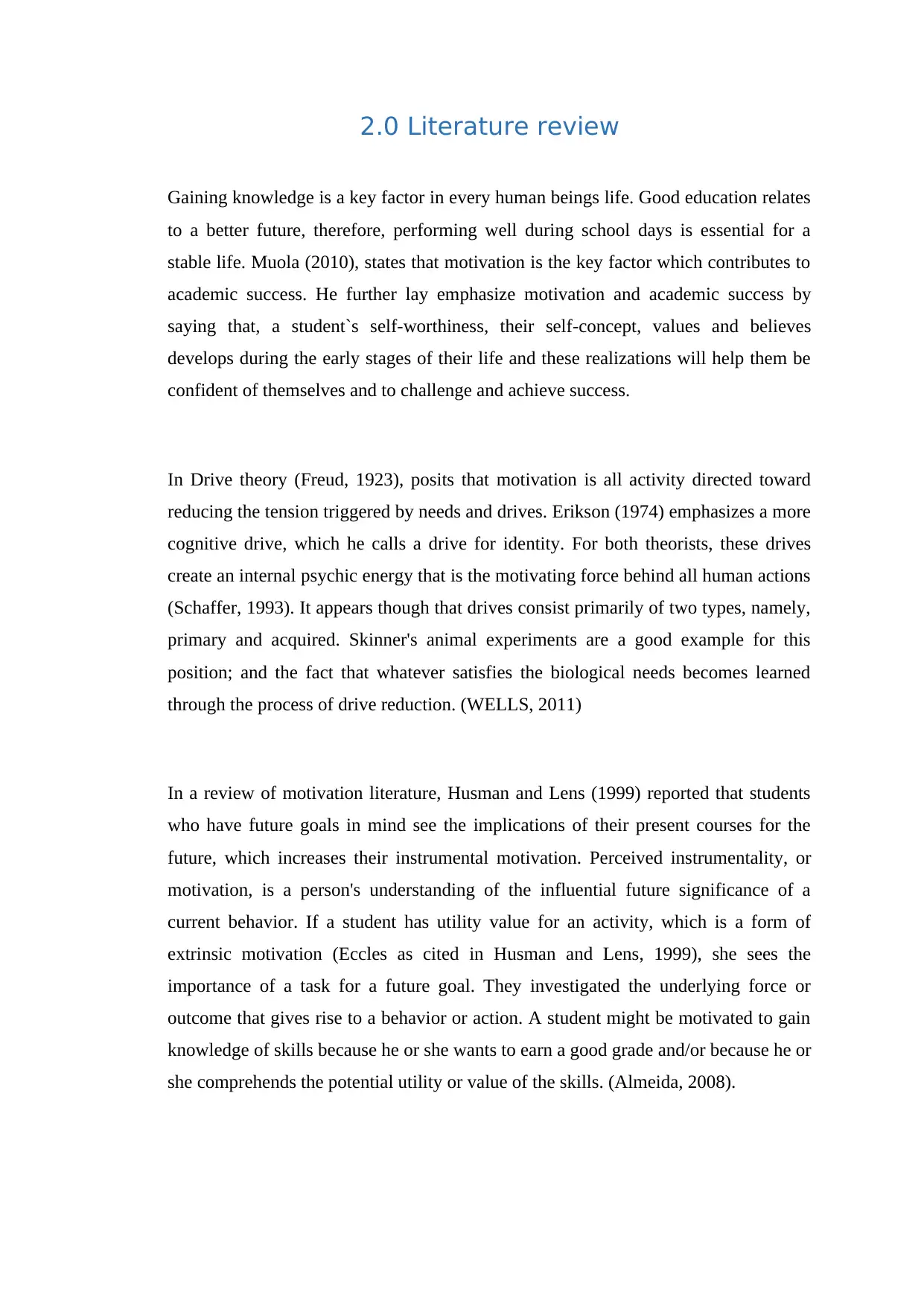
2.0 Literature review
Gaining knowledge is a key factor in every human beings life. Good education relates
to a better future, therefore, performing well during school days is essential for a
stable life. Muola (2010), states that motivation is the key factor which contributes to
academic success. He further lay emphasize motivation and academic success by
saying that, a student`s self-worthiness, their self-concept, values and believes
develops during the early stages of their life and these realizations will help them be
confident of themselves and to challenge and achieve success.
In Drive theory (Freud, 1923), posits that motivation is all activity directed toward
reducing the tension triggered by needs and drives. Erikson (1974) emphasizes a more
cognitive drive, which he calls a drive for identity. For both theorists, these drives
create an internal psychic energy that is the motivating force behind all human actions
(Schaffer, 1993). It appears though that drives consist primarily of two types, namely,
primary and acquired. Skinner's animal experiments are a good example for this
position; and the fact that whatever satisfies the biological needs becomes learned
through the process of drive reduction. (WELLS, 2011)
In a review of motivation literature, Husman and Lens (1999) reported that students
who have future goals in mind see the implications of their present courses for the
future, which increases their instrumental motivation. Perceived instrumentality, or
motivation, is a person's understanding of the influential future significance of a
current behavior. If a student has utility value for an activity, which is a form of
extrinsic motivation (Eccles as cited in Husman and Lens, 1999), she sees the
importance of a task for a future goal. They investigated the underlying force or
outcome that gives rise to a behavior or action. A student might be motivated to gain
knowledge of skills because he or she wants to earn a good grade and/or because he or
she comprehends the potential utility or value of the skills. (Almeida, 2008).
Gaining knowledge is a key factor in every human beings life. Good education relates
to a better future, therefore, performing well during school days is essential for a
stable life. Muola (2010), states that motivation is the key factor which contributes to
academic success. He further lay emphasize motivation and academic success by
saying that, a student`s self-worthiness, their self-concept, values and believes
develops during the early stages of their life and these realizations will help them be
confident of themselves and to challenge and achieve success.
In Drive theory (Freud, 1923), posits that motivation is all activity directed toward
reducing the tension triggered by needs and drives. Erikson (1974) emphasizes a more
cognitive drive, which he calls a drive for identity. For both theorists, these drives
create an internal psychic energy that is the motivating force behind all human actions
(Schaffer, 1993). It appears though that drives consist primarily of two types, namely,
primary and acquired. Skinner's animal experiments are a good example for this
position; and the fact that whatever satisfies the biological needs becomes learned
through the process of drive reduction. (WELLS, 2011)
In a review of motivation literature, Husman and Lens (1999) reported that students
who have future goals in mind see the implications of their present courses for the
future, which increases their instrumental motivation. Perceived instrumentality, or
motivation, is a person's understanding of the influential future significance of a
current behavior. If a student has utility value for an activity, which is a form of
extrinsic motivation (Eccles as cited in Husman and Lens, 1999), she sees the
importance of a task for a future goal. They investigated the underlying force or
outcome that gives rise to a behavior or action. A student might be motivated to gain
knowledge of skills because he or she wants to earn a good grade and/or because he or
she comprehends the potential utility or value of the skills. (Almeida, 2008).
Paraphrase This Document
Need a fresh take? Get an instant paraphrase of this document with our AI Paraphraser
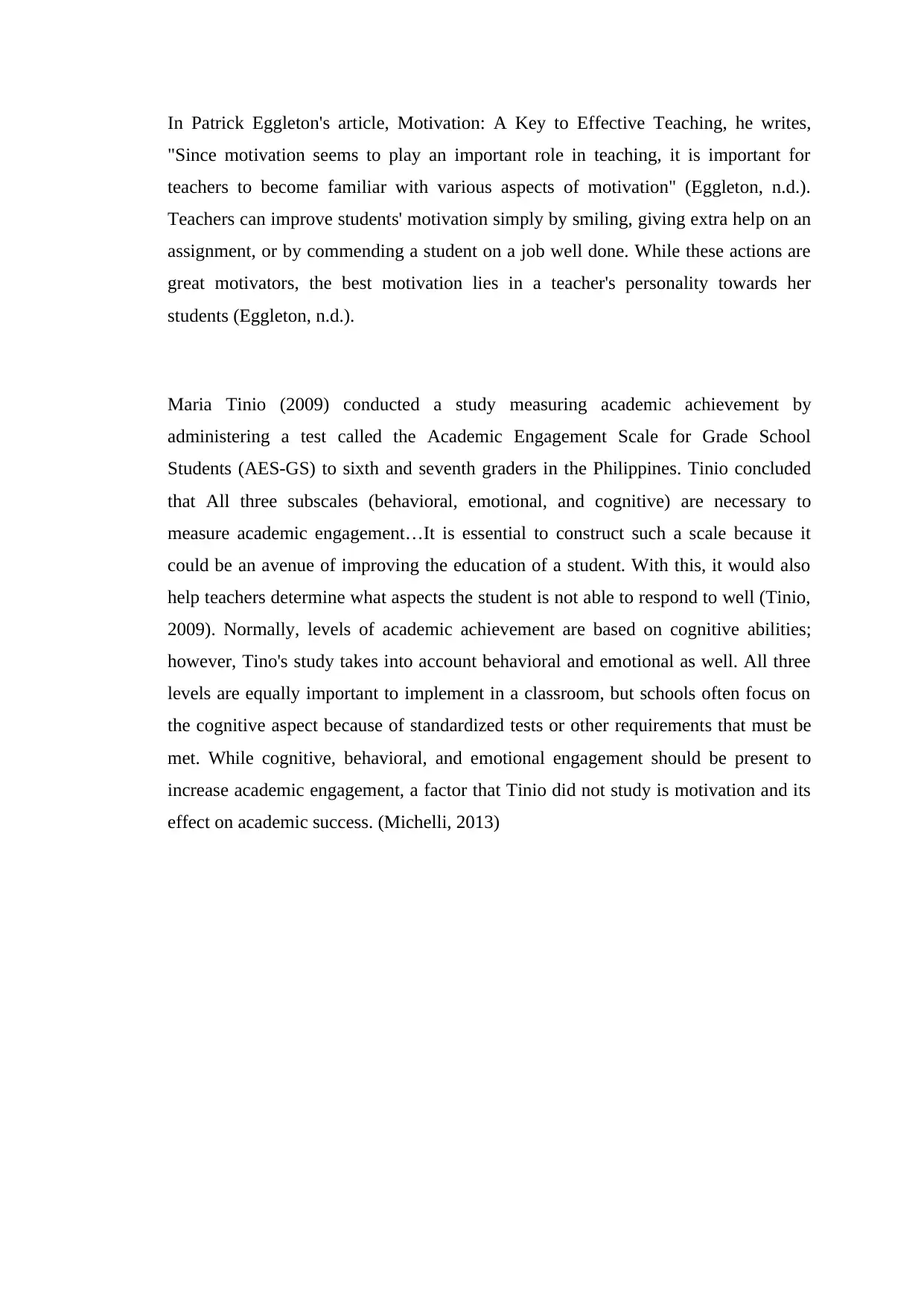
In Patrick Eggleton's article, Motivation: A Key to Effective Teaching, he writes,
"Since motivation seems to play an important role in teaching, it is important for
teachers to become familiar with various aspects of motivation" (Eggleton, n.d.).
Teachers can improve students' motivation simply by smiling, giving extra help on an
assignment, or by commending a student on a job well done. While these actions are
great motivators, the best motivation lies in a teacher's personality towards her
students (Eggleton, n.d.).
Maria Tinio (2009) conducted a study measuring academic achievement by
administering a test called the Academic Engagement Scale for Grade School
Students (AES-GS) to sixth and seventh graders in the Philippines. Tinio concluded
that All three subscales (behavioral, emotional, and cognitive) are necessary to
measure academic engagement…It is essential to construct such a scale because it
could be an avenue of improving the education of a student. With this, it would also
help teachers determine what aspects the student is not able to respond to well (Tinio,
2009). Normally, levels of academic achievement are based on cognitive abilities;
however, Tino's study takes into account behavioral and emotional as well. All three
levels are equally important to implement in a classroom, but schools often focus on
the cognitive aspect because of standardized tests or other requirements that must be
met. While cognitive, behavioral, and emotional engagement should be present to
increase academic engagement, a factor that Tinio did not study is motivation and its
effect on academic success. (Michelli, 2013)
"Since motivation seems to play an important role in teaching, it is important for
teachers to become familiar with various aspects of motivation" (Eggleton, n.d.).
Teachers can improve students' motivation simply by smiling, giving extra help on an
assignment, or by commending a student on a job well done. While these actions are
great motivators, the best motivation lies in a teacher's personality towards her
students (Eggleton, n.d.).
Maria Tinio (2009) conducted a study measuring academic achievement by
administering a test called the Academic Engagement Scale for Grade School
Students (AES-GS) to sixth and seventh graders in the Philippines. Tinio concluded
that All three subscales (behavioral, emotional, and cognitive) are necessary to
measure academic engagement…It is essential to construct such a scale because it
could be an avenue of improving the education of a student. With this, it would also
help teachers determine what aspects the student is not able to respond to well (Tinio,
2009). Normally, levels of academic achievement are based on cognitive abilities;
however, Tino's study takes into account behavioral and emotional as well. All three
levels are equally important to implement in a classroom, but schools often focus on
the cognitive aspect because of standardized tests or other requirements that must be
met. While cognitive, behavioral, and emotional engagement should be present to
increase academic engagement, a factor that Tinio did not study is motivation and its
effect on academic success. (Michelli, 2013)
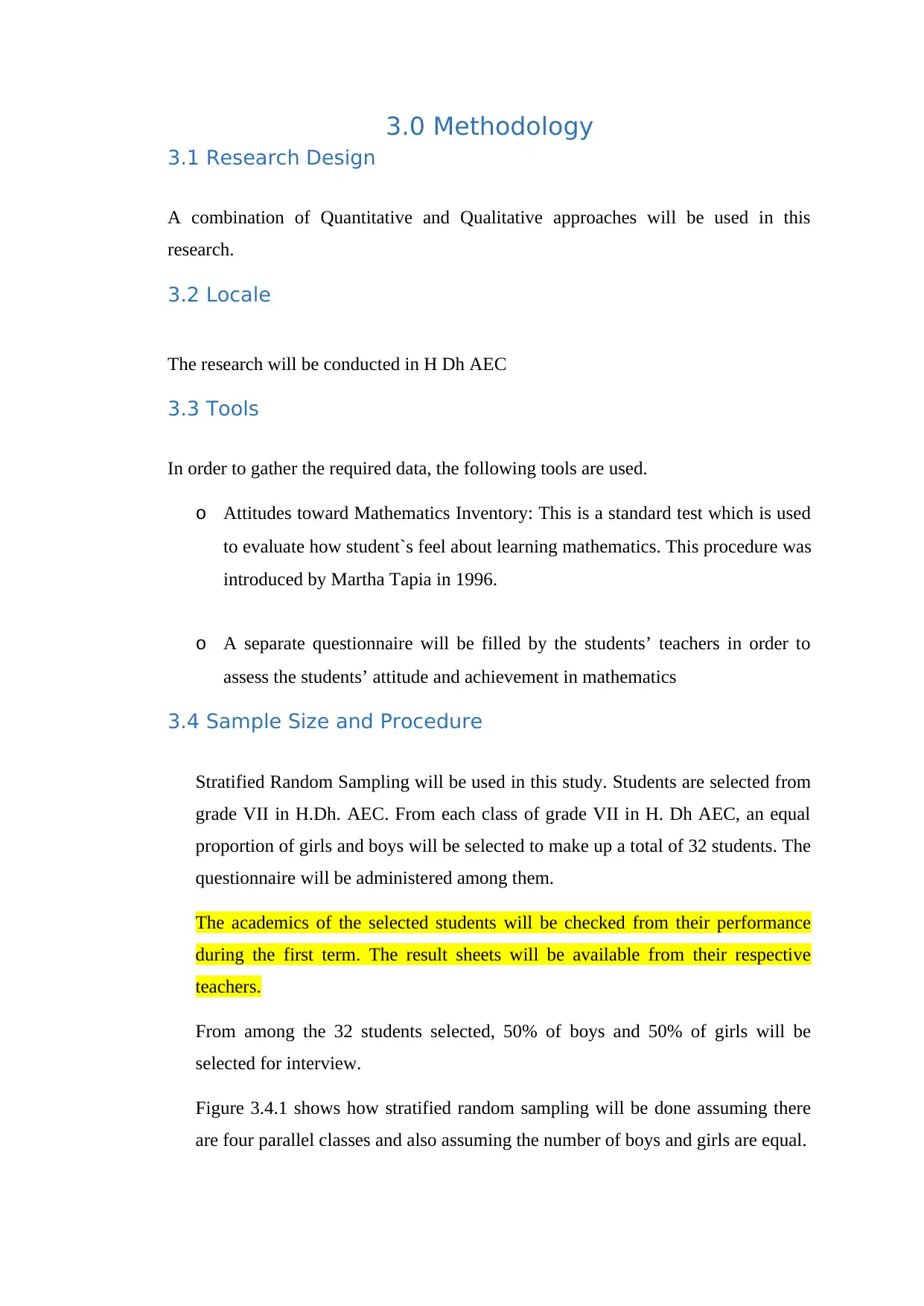
3.0 Methodology
3.1 Research Design
A combination of Quantitative and Qualitative approaches will be used in this
research.
3.2 Locale
The research will be conducted in H Dh AEC
3.3 Tools
In order to gather the required data, the following tools are used.
o Attitudes toward Mathematics Inventory: This is a standard test which is used
to evaluate how student`s feel about learning mathematics. This procedure was
introduced by Martha Tapia in 1996.
o A separate questionnaire will be filled by the students’ teachers in order to
assess the students’ attitude and achievement in mathematics
3.4 Sample Size and Procedure
Stratified Random Sampling will be used in this study. Students are selected from
grade VII in H.Dh. AEC. From each class of grade VII in H. Dh AEC, an equal
proportion of girls and boys will be selected to make up a total of 32 students. The
questionnaire will be administered among them.
The academics of the selected students will be checked from their performance
during the first term. The result sheets will be available from their respective
teachers.
From among the 32 students selected, 50% of boys and 50% of girls will be
selected for interview.
Figure 3.4.1 shows how stratified random sampling will be done assuming there
are four parallel classes and also assuming the number of boys and girls are equal.
3.1 Research Design
A combination of Quantitative and Qualitative approaches will be used in this
research.
3.2 Locale
The research will be conducted in H Dh AEC
3.3 Tools
In order to gather the required data, the following tools are used.
o Attitudes toward Mathematics Inventory: This is a standard test which is used
to evaluate how student`s feel about learning mathematics. This procedure was
introduced by Martha Tapia in 1996.
o A separate questionnaire will be filled by the students’ teachers in order to
assess the students’ attitude and achievement in mathematics
3.4 Sample Size and Procedure
Stratified Random Sampling will be used in this study. Students are selected from
grade VII in H.Dh. AEC. From each class of grade VII in H. Dh AEC, an equal
proportion of girls and boys will be selected to make up a total of 32 students. The
questionnaire will be administered among them.
The academics of the selected students will be checked from their performance
during the first term. The result sheets will be available from their respective
teachers.
From among the 32 students selected, 50% of boys and 50% of girls will be
selected for interview.
Figure 3.4.1 shows how stratified random sampling will be done assuming there
are four parallel classes and also assuming the number of boys and girls are equal.
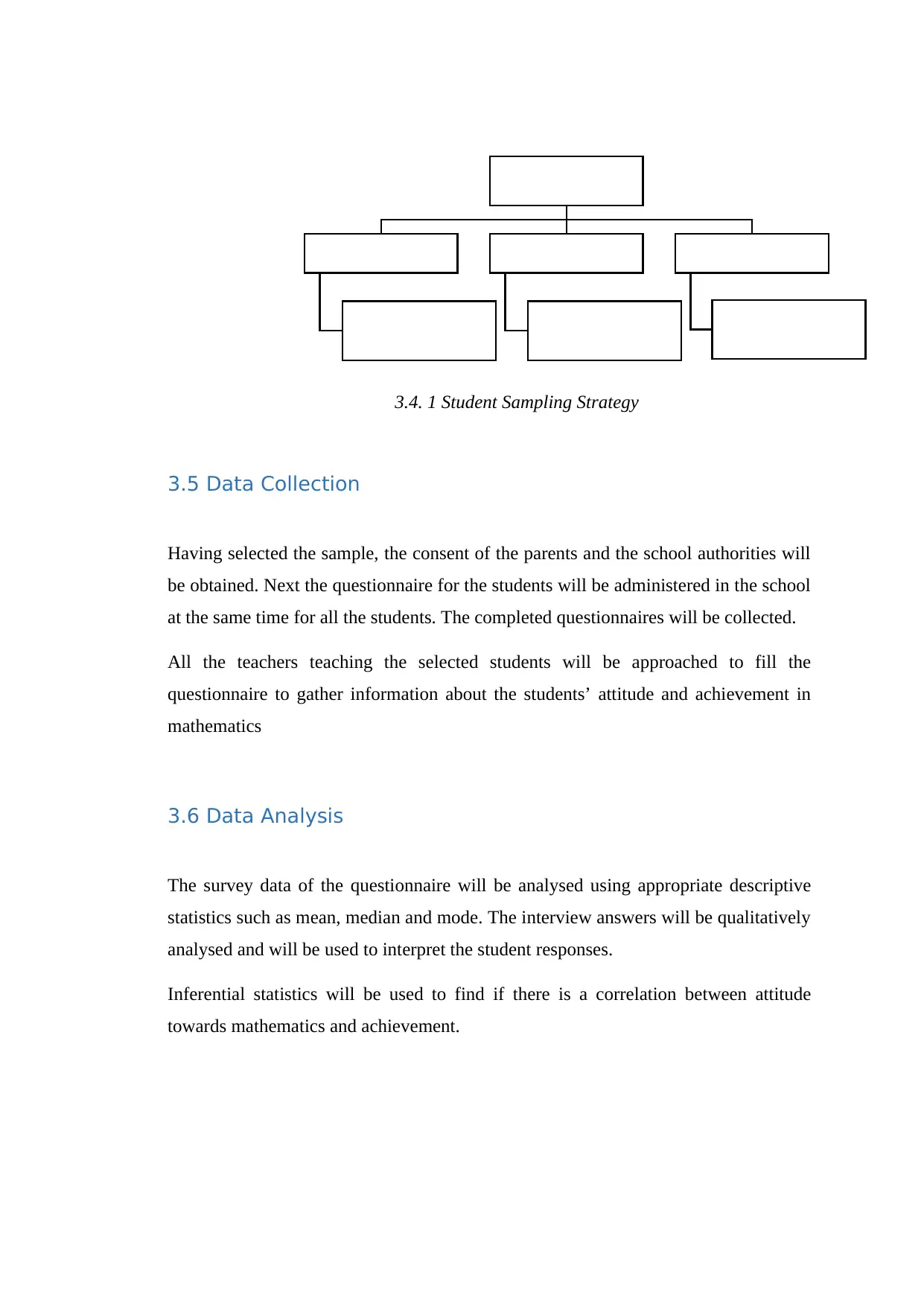
3.4. 1 Student Sampling Strategy
3.5 Data Collection
Having selected the sample, the consent of the parents and the school authorities will
be obtained. Next the questionnaire for the students will be administered in the school
at the same time for all the students. The completed questionnaires will be collected.
All the teachers teaching the selected students will be approached to fill the
questionnaire to gather information about the students’ attitude and achievement in
mathematics
3.6 Data Analysis
The survey data of the questionnaire will be analysed using appropriate descriptive
statistics such as mean, median and mode. The interview answers will be qualitatively
analysed and will be used to interpret the student responses.
Inferential statistics will be used to find if there is a correlation between attitude
towards mathematics and achievement.
32 students
Class 1
8 girls
8 boys
Class 2
8 girls
8 boys
Class 3
8 girls
8 boys
3.5 Data Collection
Having selected the sample, the consent of the parents and the school authorities will
be obtained. Next the questionnaire for the students will be administered in the school
at the same time for all the students. The completed questionnaires will be collected.
All the teachers teaching the selected students will be approached to fill the
questionnaire to gather information about the students’ attitude and achievement in
mathematics
3.6 Data Analysis
The survey data of the questionnaire will be analysed using appropriate descriptive
statistics such as mean, median and mode. The interview answers will be qualitatively
analysed and will be used to interpret the student responses.
Inferential statistics will be used to find if there is a correlation between attitude
towards mathematics and achievement.
32 students
Class 1
8 girls
8 boys
Class 2
8 girls
8 boys
Class 3
8 girls
8 boys
Secure Best Marks with AI Grader
Need help grading? Try our AI Grader for instant feedback on your assignments.
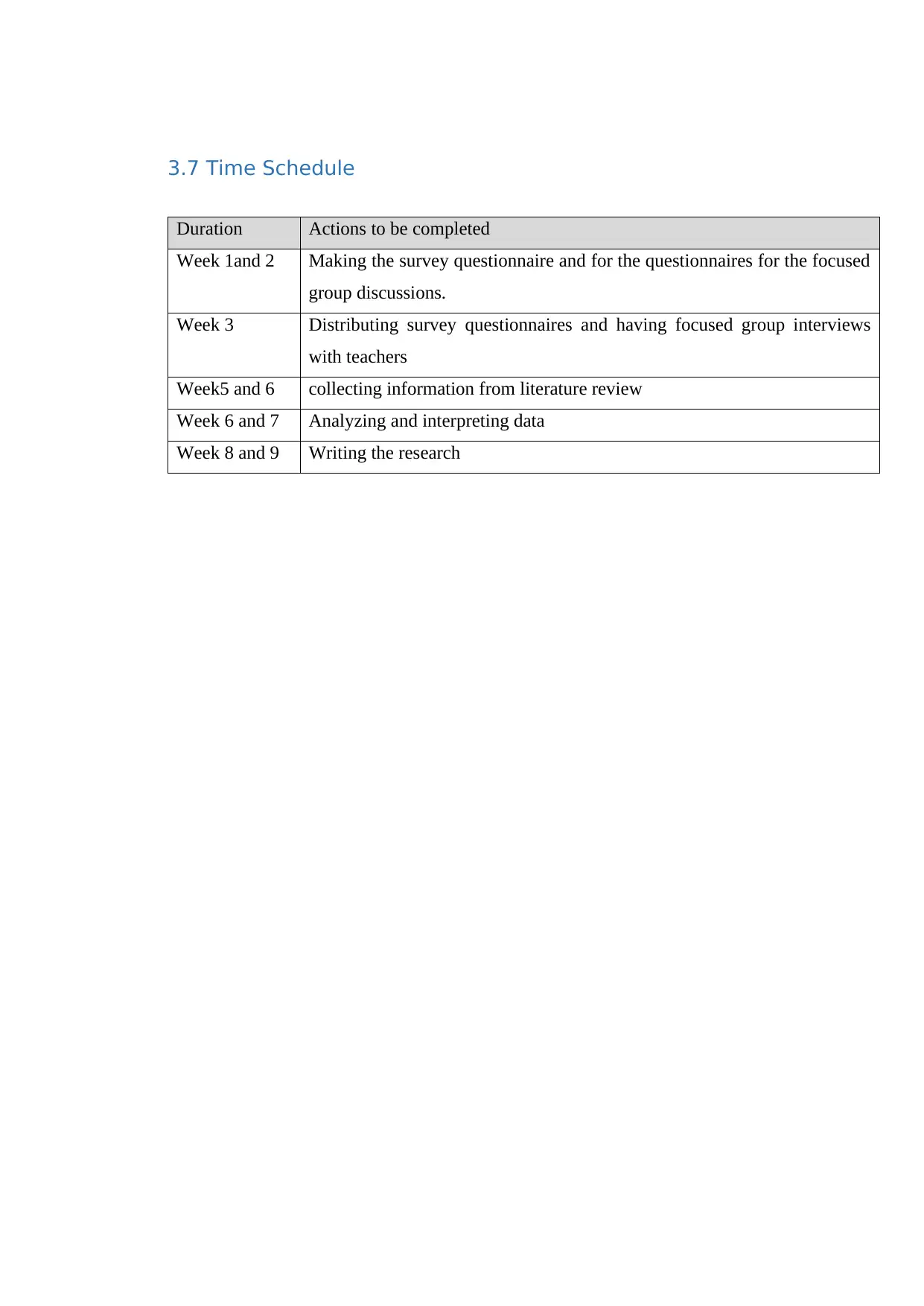
3.7 Time Schedule
Duration Actions to be completed
Week 1and 2 Making the survey questionnaire and for the questionnaires for the focused
group discussions.
Week 3 Distributing survey questionnaires and having focused group interviews
with teachers
Week5 and 6 collecting information from literature review
Week 6 and 7 Analyzing and interpreting data
Week 8 and 9 Writing the research
Duration Actions to be completed
Week 1and 2 Making the survey questionnaire and for the questionnaires for the focused
group discussions.
Week 3 Distributing survey questionnaires and having focused group interviews
with teachers
Week5 and 6 collecting information from literature review
Week 6 and 7 Analyzing and interpreting data
Week 8 and 9 Writing the research
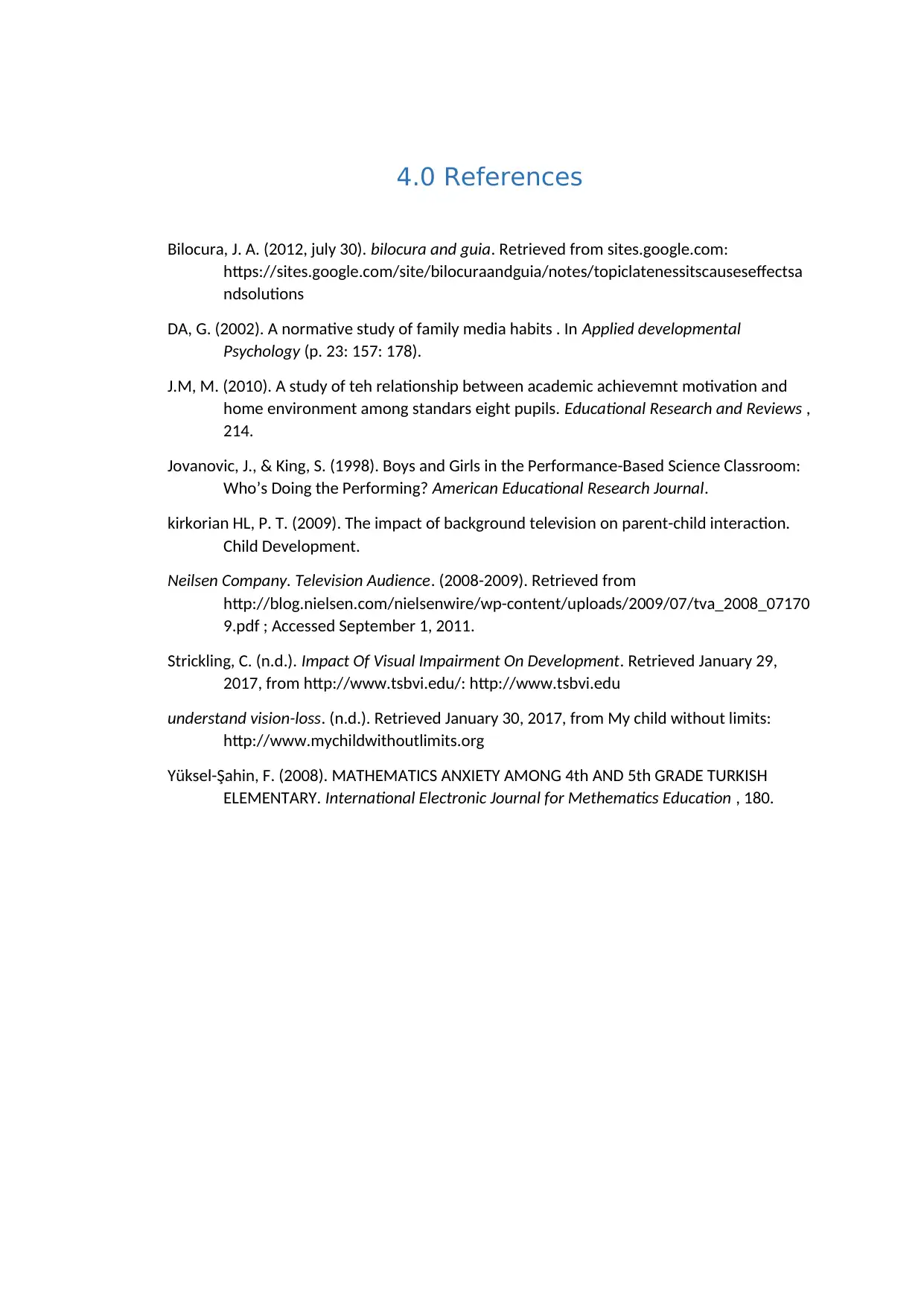
4.0 References
Bilocura, J. A. (2012, july 30). bilocura and guia. Retrieved from sites.google.com:
https://sites.google.com/site/bilocuraandguia/notes/topiclatenessitscauseseffectsa
ndsolutions
DA, G. (2002). A normative study of family media habits . In Applied developmental
Psychology (p. 23: 157: 178).
J.M, M. (2010). A study of teh relationship between academic achievemnt motivation and
home environment among standars eight pupils. Educational Research and Reviews ,
214.
Jovanovic, J., & King, S. (1998). Boys and Girls in the Performance-Based Science Classroom:
Who’s Doing the Performing? American Educational Research Journal.
kirkorian HL, P. T. (2009). The impact of background television on parent-child interaction.
Child Development.
Neilsen Company. Television Audience. (2008-2009). Retrieved from
http://blog.nielsen.com/nielsenwire/wp-content/uploads/2009/07/tva_2008_07170
9.pdf ; Accessed September 1, 2011.
Strickling, C. (n.d.). Impact Of Visual Impairment On Development. Retrieved January 29,
2017, from http://www.tsbvi.edu/: http://www.tsbvi.edu
understand vision-loss. (n.d.). Retrieved January 30, 2017, from My child without limits:
http://www.mychildwithoutlimits.org
Yüksel-Şahin, F. (2008). MATHEMATICS ANXIETY AMONG 4th AND 5th GRADE TURKISH
ELEMENTARY. International Electronic Journal for Methematics Education , 180.
Bilocura, J. A. (2012, july 30). bilocura and guia. Retrieved from sites.google.com:
https://sites.google.com/site/bilocuraandguia/notes/topiclatenessitscauseseffectsa
ndsolutions
DA, G. (2002). A normative study of family media habits . In Applied developmental
Psychology (p. 23: 157: 178).
J.M, M. (2010). A study of teh relationship between academic achievemnt motivation and
home environment among standars eight pupils. Educational Research and Reviews ,
214.
Jovanovic, J., & King, S. (1998). Boys and Girls in the Performance-Based Science Classroom:
Who’s Doing the Performing? American Educational Research Journal.
kirkorian HL, P. T. (2009). The impact of background television on parent-child interaction.
Child Development.
Neilsen Company. Television Audience. (2008-2009). Retrieved from
http://blog.nielsen.com/nielsenwire/wp-content/uploads/2009/07/tva_2008_07170
9.pdf ; Accessed September 1, 2011.
Strickling, C. (n.d.). Impact Of Visual Impairment On Development. Retrieved January 29,
2017, from http://www.tsbvi.edu/: http://www.tsbvi.edu
understand vision-loss. (n.d.). Retrieved January 30, 2017, from My child without limits:
http://www.mychildwithoutlimits.org
Yüksel-Şahin, F. (2008). MATHEMATICS ANXIETY AMONG 4th AND 5th GRADE TURKISH
ELEMENTARY. International Electronic Journal for Methematics Education , 180.
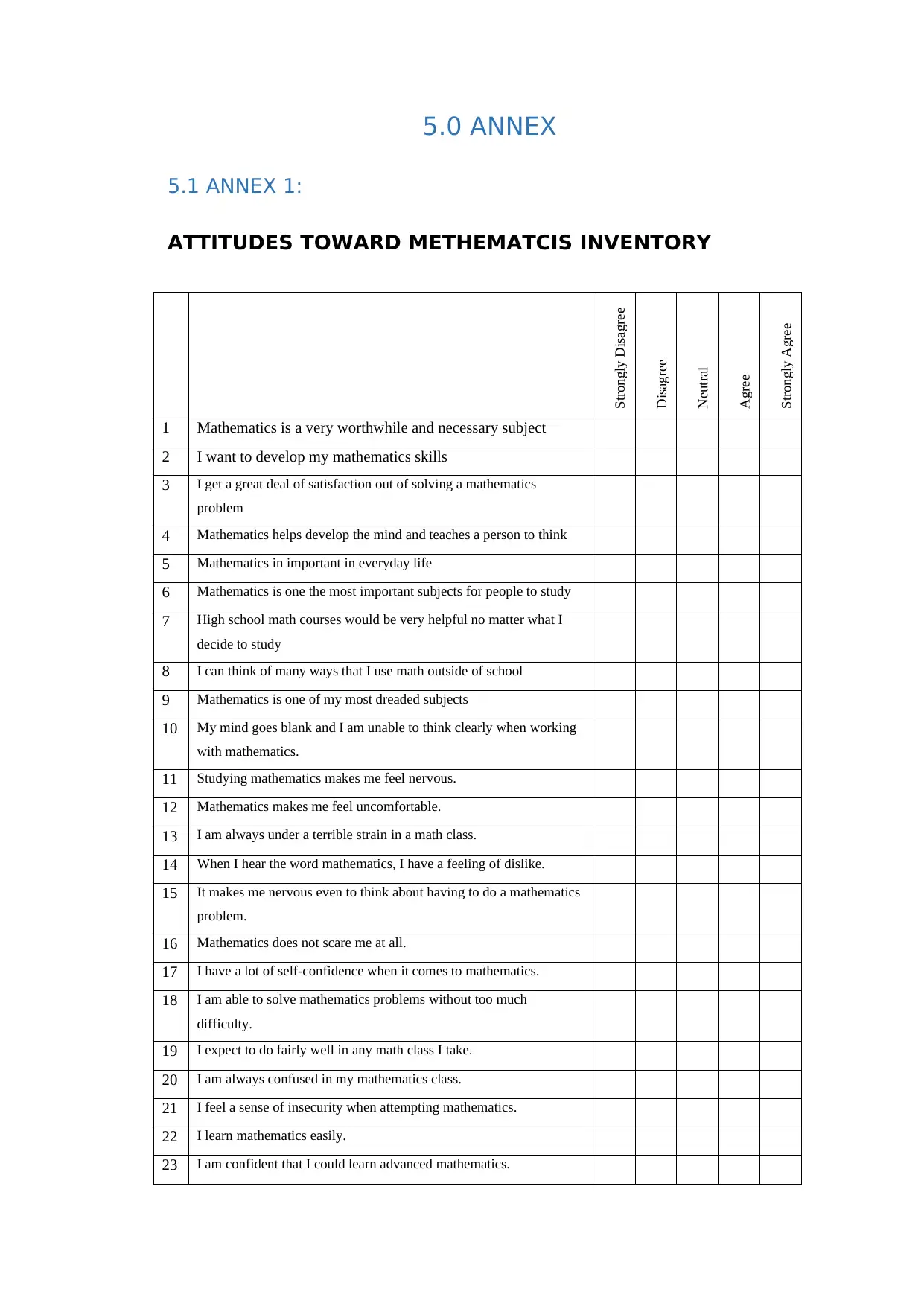
5.0 ANNEX
5.1 ANNEX 1:
ATTITUDES TOWARD METHEMATCIS INVENTORY
Strongly Disagree
Disagree
Neutral
Agree
Strongly Agree
1 Mathematics is a very worthwhile and necessary subject
2 I want to develop my mathematics skills
3 I get a great deal of satisfaction out of solving a mathematics
problem
4 Mathematics helps develop the mind and teaches a person to think
5 Mathematics in important in everyday life
6 Mathematics is one the most important subjects for people to study
7 High school math courses would be very helpful no matter what I
decide to study
8 I can think of many ways that I use math outside of school
9 Mathematics is one of my most dreaded subjects
10 My mind goes blank and I am unable to think clearly when working
with mathematics.
11 Studying mathematics makes me feel nervous.
12 Mathematics makes me feel uncomfortable.
13 I am always under a terrible strain in a math class.
14 When I hear the word mathematics, I have a feeling of dislike.
15 It makes me nervous even to think about having to do a mathematics
problem.
16 Mathematics does not scare me at all.
17 I have a lot of self-confidence when it comes to mathematics.
18 I am able to solve mathematics problems without too much
difficulty.
19 I expect to do fairly well in any math class I take.
20 I am always confused in my mathematics class.
21 I feel a sense of insecurity when attempting mathematics.
22 I learn mathematics easily.
23 I am confident that I could learn advanced mathematics.
5.1 ANNEX 1:
ATTITUDES TOWARD METHEMATCIS INVENTORY
Strongly Disagree
Disagree
Neutral
Agree
Strongly Agree
1 Mathematics is a very worthwhile and necessary subject
2 I want to develop my mathematics skills
3 I get a great deal of satisfaction out of solving a mathematics
problem
4 Mathematics helps develop the mind and teaches a person to think
5 Mathematics in important in everyday life
6 Mathematics is one the most important subjects for people to study
7 High school math courses would be very helpful no matter what I
decide to study
8 I can think of many ways that I use math outside of school
9 Mathematics is one of my most dreaded subjects
10 My mind goes blank and I am unable to think clearly when working
with mathematics.
11 Studying mathematics makes me feel nervous.
12 Mathematics makes me feel uncomfortable.
13 I am always under a terrible strain in a math class.
14 When I hear the word mathematics, I have a feeling of dislike.
15 It makes me nervous even to think about having to do a mathematics
problem.
16 Mathematics does not scare me at all.
17 I have a lot of self-confidence when it comes to mathematics.
18 I am able to solve mathematics problems without too much
difficulty.
19 I expect to do fairly well in any math class I take.
20 I am always confused in my mathematics class.
21 I feel a sense of insecurity when attempting mathematics.
22 I learn mathematics easily.
23 I am confident that I could learn advanced mathematics.
Paraphrase This Document
Need a fresh take? Get an instant paraphrase of this document with our AI Paraphraser
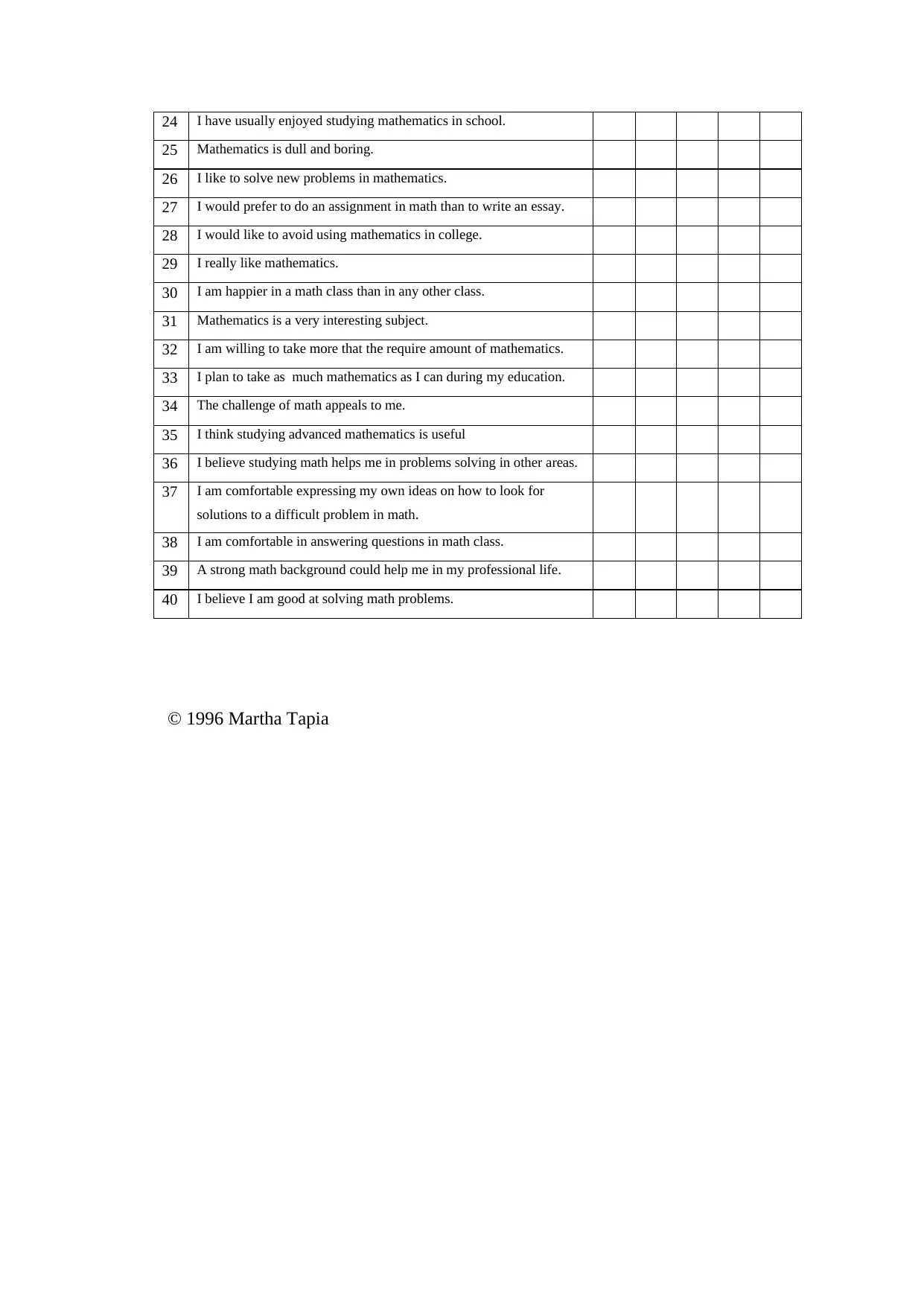
24 I have usually enjoyed studying mathematics in school.
25 Mathematics is dull and boring.
26 I like to solve new problems in mathematics.
27 I would prefer to do an assignment in math than to write an essay.
28 I would like to avoid using mathematics in college.
29 I really like mathematics.
30 I am happier in a math class than in any other class.
31 Mathematics is a very interesting subject.
32 I am willing to take more that the require amount of mathematics.
33 I plan to take as much mathematics as I can during my education.
34 The challenge of math appeals to me.
35 I think studying advanced mathematics is useful
36 I believe studying math helps me in problems solving in other areas.
37 I am comfortable expressing my own ideas on how to look for
solutions to a difficult problem in math.
38 I am comfortable in answering questions in math class.
39 A strong math background could help me in my professional life.
40 I believe I am good at solving math problems.
© 1996 Martha Tapia
25 Mathematics is dull and boring.
26 I like to solve new problems in mathematics.
27 I would prefer to do an assignment in math than to write an essay.
28 I would like to avoid using mathematics in college.
29 I really like mathematics.
30 I am happier in a math class than in any other class.
31 Mathematics is a very interesting subject.
32 I am willing to take more that the require amount of mathematics.
33 I plan to take as much mathematics as I can during my education.
34 The challenge of math appeals to me.
35 I think studying advanced mathematics is useful
36 I believe studying math helps me in problems solving in other areas.
37 I am comfortable expressing my own ideas on how to look for
solutions to a difficult problem in math.
38 I am comfortable in answering questions in math class.
39 A strong math background could help me in my professional life.
40 I believe I am good at solving math problems.
© 1996 Martha Tapia
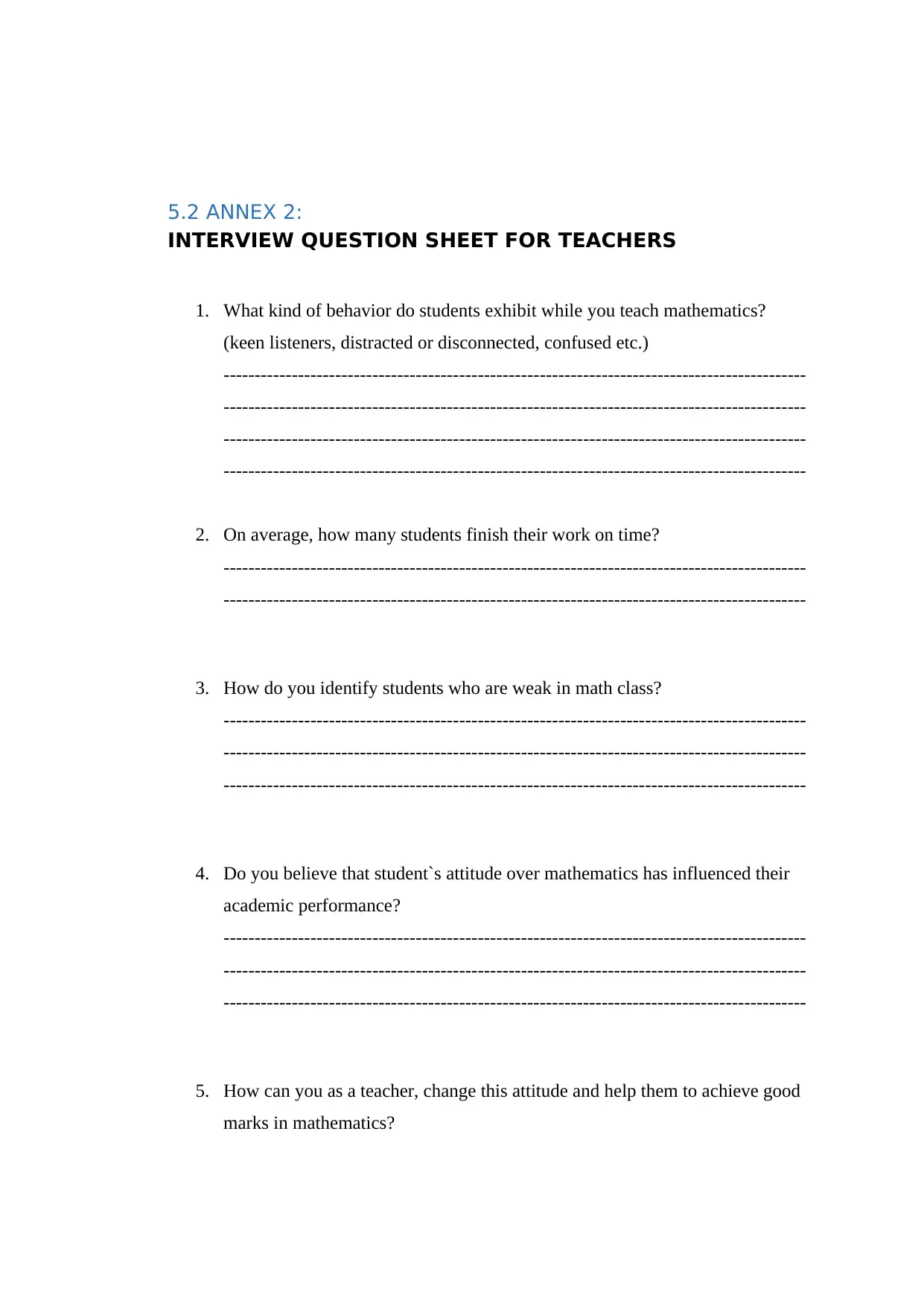
5.2 ANNEX 2:
INTERVIEW QUESTION SHEET FOR TEACHERS
1. What kind of behavior do students exhibit while you teach mathematics?
(keen listeners, distracted or disconnected, confused etc.)
----------------------------------------------------------------------------------------------
----------------------------------------------------------------------------------------------
----------------------------------------------------------------------------------------------
----------------------------------------------------------------------------------------------
2. On average, how many students finish their work on time?
----------------------------------------------------------------------------------------------
----------------------------------------------------------------------------------------------
3. How do you identify students who are weak in math class?
----------------------------------------------------------------------------------------------
----------------------------------------------------------------------------------------------
----------------------------------------------------------------------------------------------
4. Do you believe that student`s attitude over mathematics has influenced their
academic performance?
----------------------------------------------------------------------------------------------
----------------------------------------------------------------------------------------------
----------------------------------------------------------------------------------------------
5. How can you as a teacher, change this attitude and help them to achieve good
marks in mathematics?
INTERVIEW QUESTION SHEET FOR TEACHERS
1. What kind of behavior do students exhibit while you teach mathematics?
(keen listeners, distracted or disconnected, confused etc.)
----------------------------------------------------------------------------------------------
----------------------------------------------------------------------------------------------
----------------------------------------------------------------------------------------------
----------------------------------------------------------------------------------------------
2. On average, how many students finish their work on time?
----------------------------------------------------------------------------------------------
----------------------------------------------------------------------------------------------
3. How do you identify students who are weak in math class?
----------------------------------------------------------------------------------------------
----------------------------------------------------------------------------------------------
----------------------------------------------------------------------------------------------
4. Do you believe that student`s attitude over mathematics has influenced their
academic performance?
----------------------------------------------------------------------------------------------
----------------------------------------------------------------------------------------------
----------------------------------------------------------------------------------------------
5. How can you as a teacher, change this attitude and help them to achieve good
marks in mathematics?
1 out of 15
Your All-in-One AI-Powered Toolkit for Academic Success.
+13062052269
info@desklib.com
Available 24*7 on WhatsApp / Email
![[object Object]](/_next/static/media/star-bottom.7253800d.svg)
Unlock your academic potential
© 2024 | Zucol Services PVT LTD | All rights reserved.


